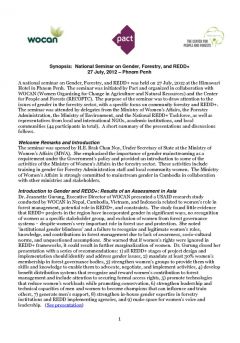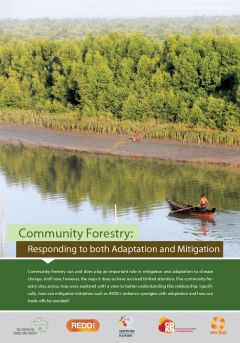Location
RECOFTC
RECOFTC is derived from an abbreviated form of the organization's legal name, Regional Community Forestry Training Center for Asia and the Pacific. Formerly the organization was known as RECOFTC – The Center for People and Forests.
RECOFTC – The Center for People and Forests is an international not-for-profit organization that focuses on capacity building for community forestry in the Asia Pacific region. It advocates for the increased involvement of local communities living in and around forests - some 450 million people in Asia-Pacific - in the equitable and ecologically sustainable management of forest landscapes.
The Regional Community Forestry Training Center for Asia and the Pacific (RECOFTC) opened in Bangkok, Thailand, in March 1987 with support from the United Nations Food and Agriculture Organization, the Government of Switzerland (through the Asian Development Bank), and Thailand's Kasetsart University.
Community forestry is widely acknowledged as a powerful solution for many of the challenges facing local people and the wider society, especially in improving rural livelihoods, enhancing community governance and empowerment, transforming forest-related conflict, protecting and enhancing the environment, and helping to fight climate change. As a capacity-building organisation, RECOFTC improves the ability of people and organisations to conduct community forestry effectively and sustainably.
RECOFTC works toward its mission through four thematic areas:
- expanding community forestry
- people, forests and climate change
- transforming forest conflict
- securing local livelihoods.
Members:
Resources
Displaying 306 - 310 of 485International Knowledge Sharing and Learning Workshop on Forest and Land Tenure
An international workshop on Forest and Land Tenure Reform was held in Vientiane on 28-29 August, 2012. The workshop was hosted by the National Assembly of Lao PDR, with support from RECOFTC – The Center for People and Forests through the Rights and Resources Initiatives (RRI). The key objectives of the workshop were:
Linking Adaptation and Mitigation through Community Forestry: Case Studies from Asia
"The main argument for community forestry, in the context of climate change, is that it responds to multiple interests. Forests, and in particular community forestry, represent a bundle of assets and benefits. They serve as a safety net in times of hardship and support critical ecosystems required for well-being. The cases point out that while the contributions of community forestry to mitigation are well-recognized, in the case of adaptation, community forestry is equally well placed to support adaptive capacity, but this is not automatic." - Regan Suzuki
National Seminar on Gender, Forestry, & REDD+
A national seminar on Gender, Forestry, and REDD+ was held on 27 July, 2012 at the Himawari Hotel in Phnom Penh. The seminar was initiated by Pact and organized in collaboration with WOCAN (Women Organizing for Change in Agriculture and Natural Resources) and the Center for People and Forests (RECOFTC). The purpose of the seminar was to draw attention to the issues of gender in the forestry sector, with a specific focus on community forestry and REDD+.
Over a cup of coffee, RECOFTC - ASFN Updates
Volume 2, Issue 3 of the ASEAN Social Forestry Network's (ASFN) quarterly newsletter, outlining recent project activities implemented by RECOFTC - The Center for People and Forests.
Community Forestry: Responding to both Adaptation and Mitigation
Many countries in the region are developing or revising their national climate chage adaptation strategies and it is critical that forest use by communities be considered and included within these plans. At the same time, mitigation activities such as REDD+ have rarely explicitly considered adaptation or the need to develop adaptive capacity (FAO, 2012). This means that valuable opportunities are being missed to ‘couple up’ activities with a goal to achieving results in both areas.






